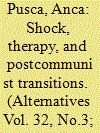| Srl | Item |
| 1 |
ID:
080006


|
|
|
|
|
| Publication |
2007.
|
| Summary/Abstract |
Since the mid-1980s, a number of authors have asserted that there is a special kind of relationship between democratic states; or that liberalism promotes peaceful relations between liberal states; or that there exists a hierarchy of states in international society with liberal states at the apex of that hierarchy. Many of these theories touch on issues of liberalism, liberal states, and the use of military force. Yet they still do not directly address the key question of: when, and for what ends, liberals believe that military force may be used. An implicit intimation is often made that there is a monolithic liberal approach to the use of force. In contrast, this article identifies a variety of contemporary liberal views on this topic and argues that these depend upon the priority given to values such as those of tolerance and consent versus progress and civility, or those of cosmopolitanism versus communitarianism. On this basis, the article examines the liberal options for the use of force that can be justified in different ways by these different values, from self-defense to the creation of liberal entities, depending upon which liberal values predominate
|
|
|
|
|
|
|
|
|
|
|
|
|
|
|
|
| 2 |
ID:
080005


|
|
|
|
|
| Publication |
2007.
|
| Summary/Abstract |
This article seeks to contextualize the concept of cosmopolitan democracy. Following a brief account of cosmopolitan thought as it relates to the idea of democracy, it focuses more closely on David Held's work over the last two decades. It then examines the role of the theory-praxis nexus in the parallel development of democratic theory and democratic practice at the global level. Held's work on cosmopolitan democracy reminds us that theory may prove useful even when it has to remain detached from existing practice for a long time for the simple reason that democratization on massive scales (more specifically, democratization of global governance) may have to benefit from possibilities rather than actualities
|
|
|
|
|
|
|
|
|
|
|
|
|
|
|
|
| 3 |
ID:
080007


|
|
|
|
|
| Publication |
2007.
|
| Summary/Abstract |
Departing from tendencies to bound precarity in particular time periods and world regions, this article develops an expansive view of precarity over time and across space. Beyond effects of specific global events and macroscale structures, precarity inhabits the microspaces of everyday life. However, people attempt to disengage the stress of precarious life by constructing the illusion of certainty. Reflexive denial of precarious life entails essentialist strategies that implicitly or explicitly classify and homogenize people and phenomena, legitimize the constructed boundaries, and in the process aim at eliminating difference and possibilities for negotiation; the tension between these goals and material realities helps explain misrepresentations that can be catastrophic at multiple scales, re-creating precarity. Reactions to 9/11 by the Bush administration represent a case in point of reflexive denial of precarity through strategies that created illusions of certainty with deleterious results. Normatively, the paradox of precarious life and reflexive denials prompts questions as to how urges for certainty in the context of precarity might be constructively channeled. the author approaches this challenge in the final section by drawing from a nexus of concerns about post-Habermasian radical democracy, individual thought and feeling, and network dynamics. Whereas Hardt and Negri reverse the direction of the Foucauldian concept of biopower from top-down to bottom-up, the author draws from Foucault's concept of governmentality in relation to resistance to imagine a cooperative politics operating within as well as across scales
|
|
|
|
|
|
|
|
|
|
|
|
|
|
|
|
| 4 |
ID:
080008


|
|
|
|
|
| Publication |
2007.
|
| Summary/Abstract |
This article explores how the concept of shock has been used in connection to processes of social change and transition, and argues that a wider exploration of the concept in fields other than political science and international relations can provide us with important insights into the individual and collective impacts of transitions. Although criticizing the idea of shock as therapy, the article presents a number of alternative uses of shock that can be particularly insightful for understanding often contradictory behaviors that characterize periods of transition, as well as a series of dangerous consequences of attempts to deal with shock through various techniques of distancing, distraction, and normalization
|
|
|
|
|
|
|
|
|
|
|
|
|
|
|
|